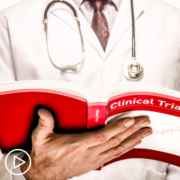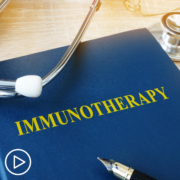Key Next Steps After a Lung Cancer Diagnosis: Expert Advice
Key Next Steps After a Lung Cancer Diagnosis: Expert Advice from Patient Empowerment Network on Vimeo.
Following a lung cancer diagnosis, the actions that a patient takes may impact their long-term care and treatment options. Dr. Erin Schenk, a lung cancer specialist, lists key steps a patient should consider post-diagnosis.
Dr. Erin Schenk is an assistant professor in the division of medical oncology at the University of Colorado Anschutz Medical Center. Learn more about Dr. Schenk and her lung cancer research here.
See More From the The Pro-Active Lung Cancer Patient Toolkit
Related Programs:

Diagnosed with Lung Cancer? Why You Should Seek a Second Opinion |

Why You Should Consider a Clinical Trial for Lung Cancer Treatment |

|
Transcript:
As a medical oncologist who takes care of lung cancer patients, I would recommend that if you or a loved one are diagnosed with lung cancer, going to your meeting with the cancer doctor report the surgeon or the radiation doctor with a couple of main questions to ask in order to better understand your diagnosis and the treatment options.
So, the first one is what stage and stage is a descriptor that we use that talks about how far the lung cancer has spread if it’s spread at all. And sometimes, this involves additional testing to give you the best, most accurate answer. Oftentimes, patients are diagnosed with scans, but what’s also – excuse me, scans of the chest, but what’s also really important is better understanding whether or not lymph nodes in the middle of the chest are also involved.
This can require either a PET scan or occasionally procedures where tissue, the lymph nodes biopsied, and tissue samples are taken to see if the lung cancer has spread to those lymph nodes. PET scans are also able to better tell us whether or not lung cancer has spread outside of the lungs. And additionally, and MRI of the head can often be a really critical piece of information to better understand whether or not the lung cancer has spread to the brain. Unfortunately, lung cancer is one of those cancers that can spread to the brain tissue.
So, the first piece of information and more tests might be needed, is stage.
The second piece of information that’s very important is what type of lung cancer, and sometimes, this occurs hand-in-hand with better understanding stage. Usually, this involves a biopsy, so a sample of the tissue needs to be taken and then looked at underneath a microscope by a pathologist who are doctors who help us identify which type of lung cancer it is that a patient has. And then the final thing to ask your care team or your doctor is do I need additional molecular testing?
Molecular testing is a critical piece of information in order for doctors like me to help take care of lung cancer patients. Molecular testing lets us know what role immunotherapy might play in your diagnosis. It also lets us know whether or not targeted therapy which are oral pills we sometimes call TKIs are appropriate for your disease and your stage. These pieces of information, so stage, what type of lung cancer, and if molecular testing is necessary, these are, I think, the three critical pieces that you need going forward to help your cancer doctor and team better formulate a plan that is right for you.
Finally, I’d like to add in that if you are in a situation where you would like a second opinion, or you would like to get more thorough answers, I would encourage you to look for an academic center or a large medical center that has specialists who focus in on lung cancer. We are often very happy to see patients and talk with them about their treatment plan if any other tests or evaluations are needed to help you feel confident in the plan that your doctors closer to home have put together. That’s it.






